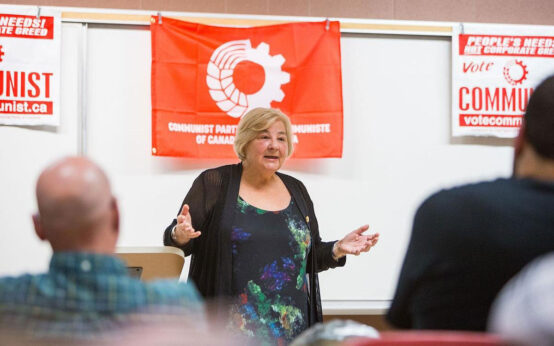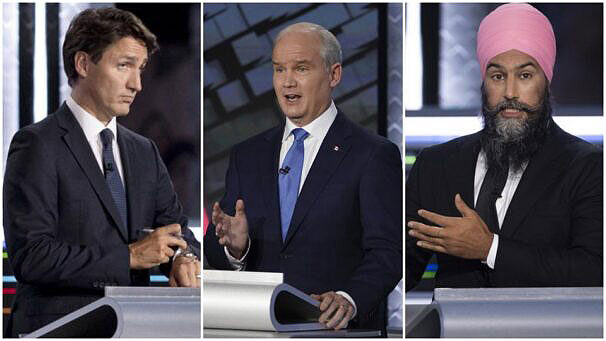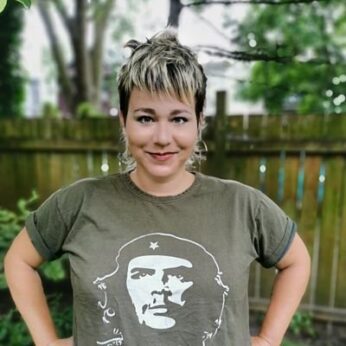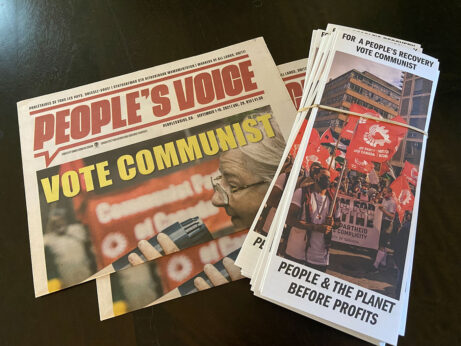
TORONTO—As voters across Canada head to the polls for the country’s 44th federal election Monday, the candidates and members of the Communist Party of Canada aren’t waiting around for the ballot counts to come in—they’re already laying the ground for the struggles that will animate the post-election period.
Fresh off a cross-Canada tour, party leader Elizabeth Rowley touched down in Toronto on Saturday afternoon, where she was greeted by more than a hundred local supporters who came out for a “People’s Picnic” turned election rally. It was the finale of a campaign that has seen the Communist Party garner a level of attention it hasn’t seen in years.

When Rowley was questioned by a journalist in Canada’s steel city, Hamilton, about news that the party was growing rapidly there, she answered the apparently worried journalist, “I’m afraid it’s all over the country.”
Elections are always an opportunity for the party to put its platform in front of a larger audience, but this one comes in a period when the pandemic and economic crisis have pulled the rug out from under millions of people. Across the country, people are eager to hear about alternatives.
According to Dave McKee, the editor of People’s Voice newspaper and the party’s former leader in the province of Ontario, more than 150,000 pieces of Communist literature were distributed over the 36 days of the election. And the social media platforms of his newspaper, which has endorsed the CP, hit more than a quarter-million views.
“I think it has something to do with capitalism,” Rowley said Saturday. She traveled coast-to-coast during the campaign, visiting eight different provinces and appearing with local Communist candidates to help boost their vote tallies. The party leader has been interviewed on national media and in outlets in nearly every region of Canada.
Speaking to the Toronto audience, she hit out at Prime Minister Justin Trudeau and his ruling Liberal Party, who called the vote in hopes of expanding their minority in parliament into a commanding majority. “Liberals needed a majority, but they misjudged. They thought we’d be exiting the pandemic and the economy would be expanding by now.”
Instead, the country stands on the precipice of the fourth wave of coronavirus, and Statistics Canada says the economy is actually contracting. By forcing an election now, Trudeau has exposed Canada to the possibility of a right-wing takeover.

Polls in the lead-up to Monday showed a neck-and-neck race between his Liberals and the Conservative Party led by Erin O’Toole. The social democratic NDP trails in third, with the slight possibility it could play the role of kingmaker. Further down the line are the Greens and the extreme right Conservative splinter party, the People’s Party of Canada (PPC). In Quebec, the Bloc Quebecois party appears poised to take about 30% of votes.
The Communists believe that, given the circumstances, a minority government is the best possible outcome. Data suggests that’s a near certainty, with the slight edge given to Trudeau. But O’Toole and the right are taking advantage of Trudeau’s many broken campaign promises from elections past in order to chip away at his support.
A national affordable childcare program, an expansion of Canada’s public health care system, and an electoral reform plan to throw out the first-past-the-post system and replace it with proportional representation—all were used by Trudeau to garner votes last time around, and all were ditched once he was in office.
“People remember these things,” Rowley told People’s World in an interview after the rally. “And it’s given the right wing a lot of ammunition. The Conservatives and the People’s Party are exploiting that for their gain, telling voters that Trudeau didn’t deliver. And unfortunately, it’s true.”
People and planet before profits
That’s why the Communists are putting forward a platform they call “A People’s Recovery.” It’s a big-picture program that goes far beyond what any of the other parties are proposing.
On the Communist agenda: a full employment economy with a 32-hour workweek and no cut in pay; the nationalization of major transport and manufacturing industry to create jobs and secure Canadian economic sovereignty; a million units of social housing; a $23 minimum wage; a free public childcare system; and the extension of health care to include prescription drugs, vision, and dental.
Pointing to the fact that since the Paris Accords of 2016 Canada has had essentially no carbon emissions reductions, Rowley said the Communists would also “nationalize energy and resources” and “close the polluting Tar Sands” of Alberta while guaranteeing the wages for displaced workers.
Linking the climate crisis to foreign policy, Rowley reminds voters that the military is the biggest source of air pollution. “Cut the military budget by 75% and you make a big hit against carbon emissions,” she said.
Those are just some highlights of the party’s platform, which also calls for a “new, equal, and voluntary partnership” between Indigenous nations, Quebec, Acadians, and English-speaking Canada. The end of university tuition fees and the abolition of student debt and doubling corporate tax rates are other popular items at voters’ doorsteps and on the streets.
“People aren’t stupid. We’re heading into a dark winter,” Rowley said. In the past, people might have looked at Communist candidates, perhaps wished them good luck, and then went about their business. But now people are hurting, and they’re looking for the reasons why. “They’re saying, ‘Capitalism ain’t working for me.’”
Blocking the right
When jobs are scarce and rents and mortgages are hard to afford, the Communist program appeals to a lot more people. But so does that of the extreme right. Though it’s polling only 7% going into election day, the anti-immigrant People’s Party presents an ongoing danger. Rowley says they consist of “some fascists, some white supremacists, some misogynists, and some racists”—all mixed together with a faux populist program that complains about legitimate problems plaguing the working class like inflation and out-of-control housing costs.
They’re also behind many of the recent anti-vaccine protests across Canada. In fact, a contingent of health care workers was late in arriving to the Saturday Communist event due to snarled traffic caused by another PPC-led anti-vaxx march downtown.
“The PPC is trying to take advantage of people’s despair—a classical feature of early fascism,” Rowley told People’s World. “It’s reminiscent of the movement that built up around Trump and eventually attacked the U.S. Capitol.”
So the Communist Party and its candidates are trying to talk to as much of Canada’s multinational working class as they possibly can to combat the right’s manipulation and reach people ignored by the mainstream big business-backed parties.

That’s a big part of the motivation for Jennifer Moxon, the Communist candidate in the Toronto riding (electoral district) of Beaches-East York—an electoral district divided between a northern half populated largely by working-class and immigrant communities and a wealthier and whiter south. An 18-year social service work veteran, Moxon joined the CP four years ago after becoming frustrated with the lack of consistency and integrity she saw in other parties.
“Our riding is split class-wise,” she told People’s World in an interview on the sidelines of the Saturday rally. The biggest issue for her constituents—including those whose immigration status keeps them from voting in this election—is housing. “People can’t afford their rent now, and they still won’t be able to afford it after election day,” Moxon said.
That’s why the Communist Party has been working to get people linked up with tenants’ union efforts in their neighborhoods. “Elections are a tool to help with organizing all year-round,” according to Moxon. “Of course we want votes, but elections are not the be-all, end-all. It’s about connecting people and movements.”
Election or not, the only constant is struggle
And it would seem those efforts to connect people and movements are yielding results for the Communist Party across the country. Its membership is up 50% over the past year, and according to McKee, that growth is qualitative as well as quantitative. He believes people joining now “have a stronger sense of the party’s role in the class struggle” compared to those who joined in the “lean years” of the 1990s after the end of the Soviet Union.

“People are thinking of policy in terms of tactics—neither just being radical for radicalism’s sake nor just advocating what’s easy to pass today,” he said. “It’s about advancing the struggle”—from now all the way up to the party’s ultimate goal: socialism.
That’s why participating in electoral campaigns is so important for the Communists, even if they don’t end up sending any members of parliament to Ottawa—which they don’t expect to do this year. As McKee sees it, “You can win a lot even if you don’t win an election.”
But that doesn’t mean the Communist Party plans to just perennially put up also-ran candidates. It has a vision for a future “People’s Coalition” in parliament made up of a progressive bloc of MPs—including Communists. “Even if we elected only one Communist, our policies could change the conversation and transform this country,” Rowley argues.
Getting to that point will require a lot of on-the-ground organizing, a task which the Communists are eager to get on with.
“Things don’t stop when the ballots are counted,” Rowley reminded rally-goers on Saturday. “That’s when the struggle picks up again.”
RELATED STORIES:
Canadian Communists warn of Conservative election victory
Activists push issues of peace to forefront in Canadian election
Mass pressure needed to force concessions after Trudeau win in Canada












Comments